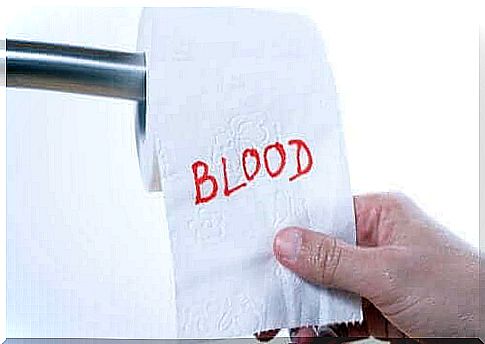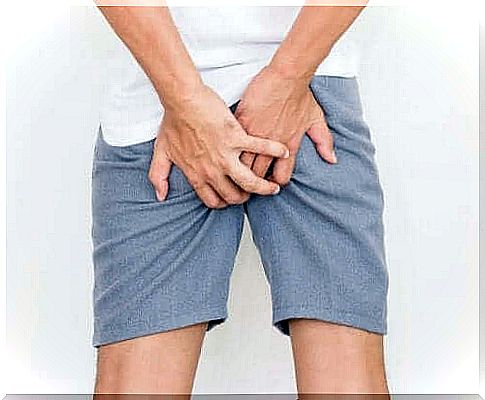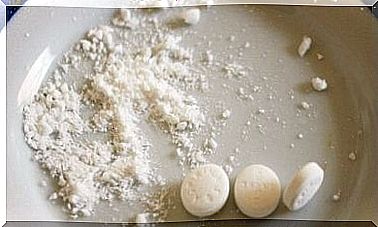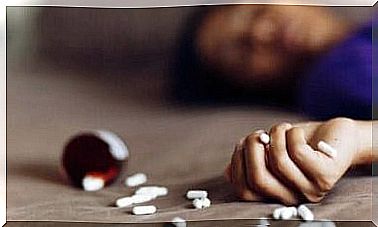Bleeding In The Rectum: Why Does It Happen?

Bleeding in the rectum can be quite scary. This is because almost everyone knows that it is one of the symptoms of colon cancer. However, finding blood when you go to the bathroom can be due to many other reasons. Not all of them are serious.
Norberto Mañas, a specialist in the digestive unit at the Hospital Clinico de San Carlos in Madrid, points out the following:
Due to the frequency and possible severity, we explain the main causes of rectal bleeding in today’s article.
How does blood get into the stool?

Blood in the stool happens for many reasons. In fact, on several occasions it may not even be visible to the naked eye. The most important ways to notice this are:
- You can see the blood yourself. It usually stains on the toilet paper after you have dried yourself. It may also appear to drip after you have been to the toilet, and this is due to bleeding at the end of the bowel or in the anus. This is the type of blood that usually comes with hemorrhoids or other fissures.
- The stools are black and tarry. This is black stool with a foul odor. It is usually due to bleeding in the upper part of the digestive system. It is actually more severe than the previous case of bleeding.
- Stools mixed with blood or blood clots. These tend to be associated with inflammatory bowel disease. They can also occur when there is the presence of polyps, as well as in cancer.
- Hidden blood. This type is not visible to the naked eye. In fact, only a medical test can detect it. However, other symptoms such as anemia without an obvious cause may indicate that there is hidden blood in the stool. In these cases, a doctor must perform a colonoscopy.
What causes bleeding in the rectum?
As we mentioned above, the most alarming reason is colon cancer. However, this is not the only situation where blood may appear in your stool. Other reasons are:

- Hemorrhoids. These are dilated veins in the anus and rectum. They occur occasionally in 3 out of 4 adults. Also, their most common cause is excessive strain when you are constipated. They are also common in mothers.
- Anal fissures. These are small cracks in the lining that cover the anus. This can happen after exposing large and hard stools. It also has to do with constipation.
- Diverticulosis. These are small lumps in the colon, and their incidence increases with age.
- Intestinal polyps. This is the extra tissue that often grows in the colon. Most of them are not dangerous. However, some can be carcinogenic.
- Gastric or duodenal ulcer. These are lesions in the wall of the stomach or intestine. Like other esophageal problems, they can lead to black, tarry stools.
- Certain changes in blood vessels. Vasculitis or angiodysplasia can cause bleeding in the rectum.
- Some infections.
- Inflammatory diseases of the digestive tract. Crohn’s disease and ulcerative colitis usually occur when there is bleeding in the rectum.
If you have bleeding in the rectum…
As you can see, bleeding in the rectum can have many different causes. It is also not always as easy to diagnose, so it can be much more serious than you think. Therefore, you should always consult your doctor.
Take notes so you can give them as much information as you can about the changes in your stools. Write down the color, frequency and type of bleeding as these facts are very important for a correct diagnosis. This is why doctors often recommend that you monitor your bowel movements.
Similarly, if you are over 50 years old, you should have a stool test performed on a regular basis. The goal is to detect hidden blood that is not visible to the naked eye. In the same way, they can also do a rectal examination, as it helps them detect hemorrhoids and tumors in it. It is also good for detecting prostate problems. It is an unpleasant test, but worth the peace of mind.
Colonoscopies are the most effective tests to rule out colon cancer. Depending on the blood type in your stool, they may perform other diagnostic tests such as gastroscopy, radiography or scintigraphy.
Conclusion
Do not worry if you find blood in your stools. The causes vary, and it is quite common for the culprit to be either hemorrhoids or an anal fissure. Do not hesitate to consult your doctor so that they can rule out other causes.









